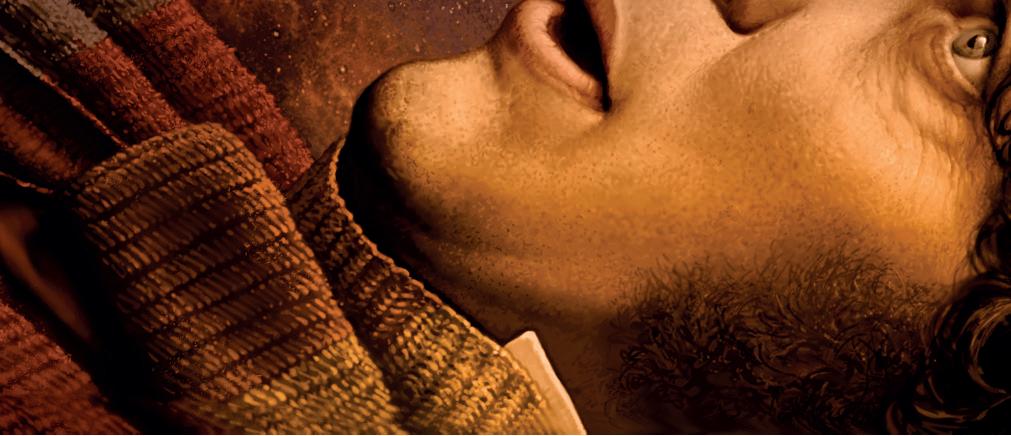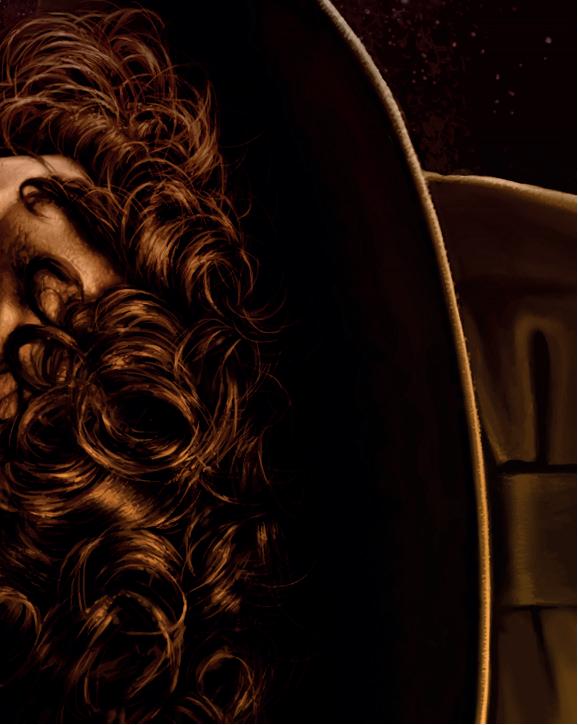











UK | USA | Canada | Ireland | Australia
India | New Zealand | South Africa
BBC Children’s Books are published by Puffin Books, part of the Penguin Random House group of companies whose addresses can be found at global.penguinrandomhouse.com. www.penguin.co.uk www.puffin.co.uk www.ladybird.co.uk
First published 2025 001
Written
by Tade Thompson
Copyright © Tade Thompson and BBC Distribution Studios Limited, 2025
BBC and DOCTOR WHO (word marks and devices) are trade marks of the British Broadcasting Corporation and are used under licence. BBC logo © BBC 1996. DOCTOR WHO logo © BBC 1973. Licensed by BBC Studios.
The moral right of the author and copyright holders has been asserted The brands mentioned in this book are trademarks belonging to third parties
Penguin Random House values and supports copyright. Copyright fuels creativity, encourages diverse voices, promotes freedom of expression and supports a vibrant culture. Thank you for purchasing an authorized edition of this book and for respecting intellectual property laws by not reproducing, scanning or distributing any part of it by any means without permission. You are supporting authors and enabling Penguin Random House to continue to publish books for everyone. No part of this book may be used or reproduced in any manner for the purpose of training artificial intelligence technologies or systems. In accordance with Article 4(3) of the DSM Directive 2019/790, Penguin Random House expressly reserves this work from the text and data mining exception.
Set in 11.5/15.5pt Bembo Book MT Pro Six Red Marbles UK, Thetford, Norfolk
Printed and bound in Great Britain by Clays Ltd, Elcograf S.p.A.
The authorized representative in the EEA is Penguin Random House Ireland, Morrison Chambers, 32 Nassau Street, Dublin D 02 YH 68
A CIP catalogue record for this book is available from the British Library
ISBN : 978–1–405–97030–3
All correspondence to:
BBC Children’s Books
Penguin Random House Children’s One Embassy Gardens, 8 Viaduct Gardens, London SW 11 7BW
Penguin Random Hous e is committed to a sustainable future for our business, our readers and our planet. is book is made from Forest Stewardship Council® certified paper.





For Katrina. You’re in the TARDIS now.

Just outside the office block, Miss Smith noticed the blue police box. Not a common sight in London any more, yet this one seemed cleaner and better maintained than a lot of the decommissioned remnants. For some reason, she didn’t like the box. It left her feeling uneasy every time she went into work, and she made it her business to look away from that patch of pavement. But today, it seemed to have shifted a bit. That couldn’t be right, of course. If it seemed closer to the lamp-post, it must be in Miss Smith’s imagination. Sweltering heat again. She felt overdressed, but this was the best anyone could do. Beachwear to work. Should be outrageous, but it didn’t feel like that in this heat.
She glanced at her watch. She was thirty minutes early, which was how she liked it, but try as she might, she never arrived before her boss. It was almost as if he slept in the office. The first thing she did on arrival each day was to check the time with Tim by dialling 846. Her wristwatch would not keep time in the office, so she had to call the Speaking Clock. Miss Smith had no idea why, since on weekends her watch showed no variation at all.
The office was on the ground floor of a townhouse, and it had its own private entrance to which Miss Smith had her own key. She unlocked the door and entered. Surely, this time she was the first in.
The office was simple: a large main area with two desks. One door to a kitchenette, the other to a lavatory. The smaller desk with a covered typewriter and telephone was hers. The typewriter was a Brother Charger, but Miss Smith preferred a Corona.
The larger desk was her employer’s, and it was occupied. He was here.
‘Good morning, Miss Smith,’ he said. His feet were up on the desk, just beside his hat, and while a portion of his long legs was visible, most of him was hidden behind a broadsheet. A long scarf dangled down and touched the floor. That ridiculous scarf. Hot enough to boil missionaries on the streets, yet he always dressed for the middle of winter.
The newspaper dropped suddenly, revealing his brown curly hair, his impish large eyes and his smile. He had an air of Puck about him always.
For One Night Only
‘I’ve made tea,’ he said. He seemed pleased with himself.
‘Good morning, sir,’ said Miss Smith. ‘I trust you had a good weekend?’
‘Weekend . . . what’s that?’ He looked genuinely puzzled.
‘Have you been working through it?’
‘Shall we just have tea?’ He shoved the paper aside, dropped his legs to the floor and rose, athletic and rapid. Miss Smith had noted this about him. He often went from stillness to full speed and back to stillness again. Tall as the Post Office Tower, yet not awkward at all.
‘Shall I pour it? I’m the secretary,’ said Miss Smith.
‘Nonsense! It’s 1976.’
Miss Smith removed the dust cover from the typewriter and sat down. The man gave her palpitations. She had been working here for two weeks now, unsure of the company name, or what it was exactly they did.
He dropped a teacup and saucer on her desk, along with a biscuit, after which he retreated to his desk and picked up his paper again.
The tea was atrocious, but this was normal for him. Miss Smith smiled and took a bite of the biscuit, loud so that he could hear.
‘Sir,’ she said.
‘Yes?’ He didn’t drop the curtains he’d made of the broadsheet.
‘What will . . . that is, what is the work for today?’
‘Ah, yes. I thought you might take a letter to The Times.’
Ye gods.
Miss Smith produced her notebook and pencil. ‘Go ahead.’
Thompson
‘Dear Editor, I hope you have been enjoying the recent weather. I should like to draw your attention to the Thursday edition of your paper. It fell short of the rather high standard I expect from The Times. Not with respect to the stories, which are passable and diverting enough, even for a busy working man such as myself. No, it is the texture of the newsprint to which I refer. On touching the paper, I find it ten per cent coarser than usual. Have you changed suppliers perchance? I’m sure a veteran newspaperman such as yourself must know that coarse paper erodes the fingerprints. What if I, or indeed any of your other readers, should commit a crime? I assure you, this is how anarchy begins. I have several suggestions on this front. One . . .’
This was Miss Smith’s work life now. She hated it, the absurdity of it, but it paid well, and jobs weren’t abundant these days. It wasn’t like her employer mistreated her. On the contrary, he was full of respect and consideration. It was just that he didn’t explain anything, and added to the confusion whenever he opened his mouth. Most of Miss Smith’s working days were empty. She did The Times crossword puzzle and typed increasingly surreal letters to the editor.
After three days into her first week, she had walked into a police station, concerned that there might be goings-on that weren’t kosher.
‘Have you witnessed a crime?’ asked the constable. ‘No.’
‘Do you suspect any criminal activity?’
‘No. Well, there’s a police box, and I don’t think –’
‘We don’t use those any more.’